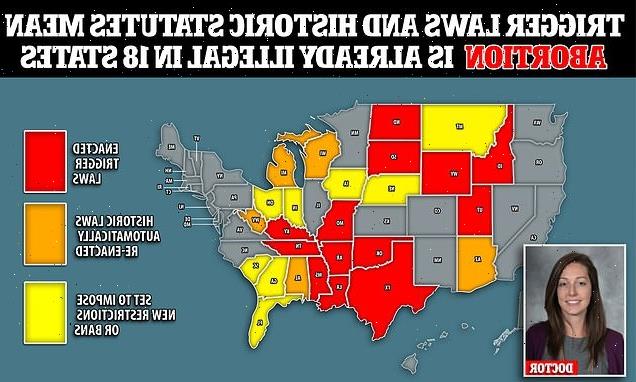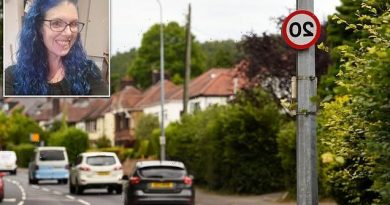Child abuse victim, 10, forced to get an abortion out of state
Child abuse victim, 10, who was six weeks pregnant is forced to travel from Ohio to Indiana for an abortion after home state outlaws it under Roe v Wade ruling
- A child abuse victim, 10, travels out of state to get an abortion after her home state of Ohio barred the procedure following the Roe v. Wade ruling
- Ohio enforced a six week ban on abortion following the overturn of the 1973 landmark Supreme Court case
- The child was six weeks and three days pregnant, making her ineligible to get an abortion in Ohio
- Dr. Caitlin Bernard, an OBGYN, assisted the minor after she traveled to Indiana for the procedure
- Bernard has seen an increase of women coming from out of state to receive an abortion as restrictions in neighboring states are strongly enforced
Dr. Caitlin Bernard, an Indiana OBGYN, received a call from a doctor in Ohio about a 10-year-old child abuse victim in need of an abortion
A 10-year-old child abuse victim was forced to seek an abortion in Indiana after her home state of Ohio barred abortion following the Supreme Court decision to overturn of Roe v. Wade.
A child abuse doctor in Ohio sought the help of Dr. Caitlin Bernard, an Indianapolis obstetrician-gynecologist, on Monday to help the girl get an abortion after the state banned the procedure after six weeks – hours after the 6-3 Supreme Court vote, The Columbus Dispatch reported.
The child was six weeks and three days pregnant – therefore, ineligible by just three days to receive the procedure in her home state.
Abortion advocates in the state attempted to halt Ohio’s six-week abortion ban, but the effort was denied by a judge on Friday.
As of Friday, Indiana’s only abortion restriction is a law requiring clinics to ask women if their abortion is coerced – which is illegal, Fox 59 reported.
The law went into effect on July 1 and more restrictions might pass in the state following The Indiana General Assembly hearing on July 25.
‘It’s hard to imagine that in just a few short weeks we will have no ability to provide that care,’ Bernard told The Columbus Dispatch.
Until then, abortion providers in Indiana say they have noticed the impact of the overturn of Roe, claiming they have seen an increase of patients coming from out of state to receive the procedure, according to The Columbus Dispatch.
The Women’s Med, an Indiana abortion clinic that also has a center in Ohio, has received patients in need of an operation from their Ohio clinic.
Dr. Katie McHugh, an OBGYN in Indiana, has witnessed ‘an insane amount of requests’ from women in Ohio and Kentucky seeking an abortion.
McHugh said she receives between five to eight patients per day that come from out of state with some clinics assisting about 20 women per day.
Thirteen states passed trigger laws to restrict or ban abortion in the event Roe v. Wade was overturned
All around the country, protesters filled the streets in opposition to the Supreme Court. Some protesters demonstrated outside the state capitals where abortions was banned effective immediately
In Kentucky, abortion centers were forced to close down after the Roe ruling when the state’s ‘trigger law’ went into effect.
The overturn of Roe v. Wade allowed for states to decide on whether to implement restrictions or bans on the procedure.
Kentucky was one of twelve states – along with Arkansas, Idaho, Louisiana, Mississippi, Missouri, North Dakota, Oklahoma, South Dakota, Tennessee, Texas, Utah, and Wyoming – to pass trigger laws that would outlaw abortion in the instance Roe was overturned.
However, a Kentucky judge on Thursday granted a temporary restraining order on Thursday to prohibit the state from enforcing the ban on abortion.
Other state including Indiana, Montana, Nebraska, Georgia, Iowa, and South Carolina, and Florida are also attempting to impose new bans and restrictions.
Following the overturn of the 1973 right to abortion, advocates scattered to state courts to stop restrictions on abortions that are planned to take effect in 22 states.
Abortion clinics in Ohio, Idaho, West Virginia and Mississippi are also seeking temporary halts to state implemented bans.
Source: Read Full Article





